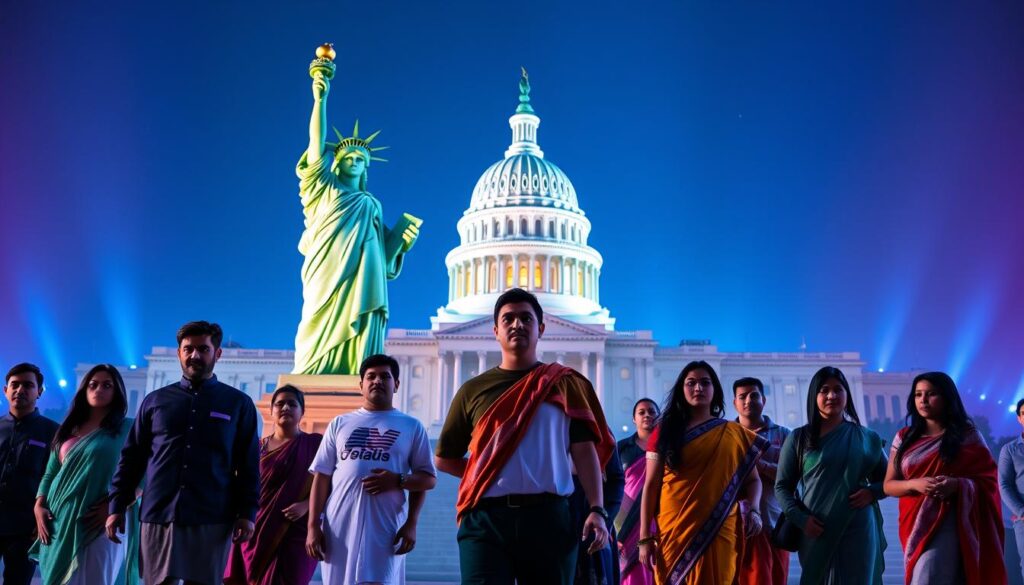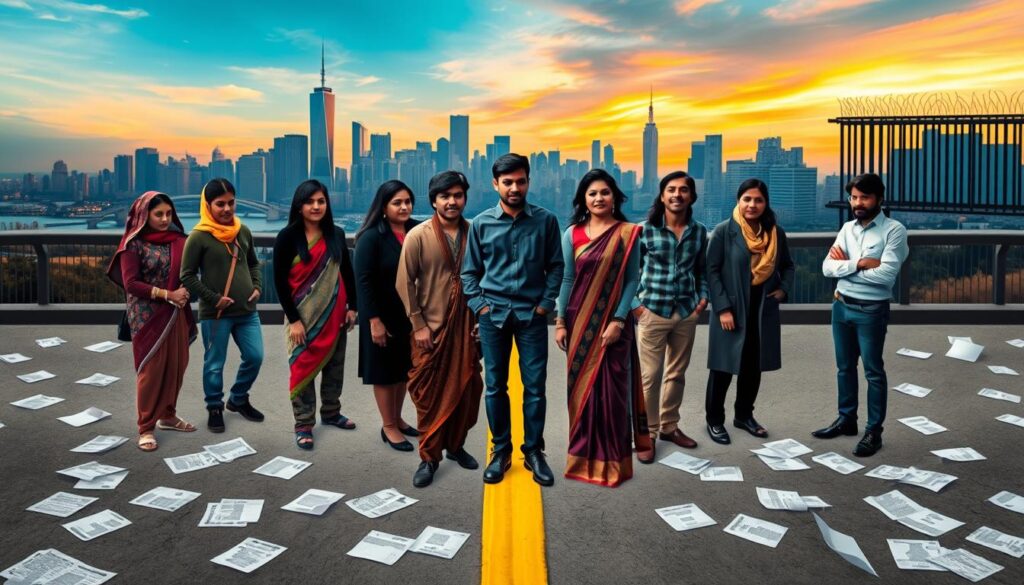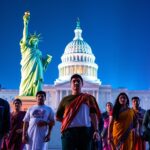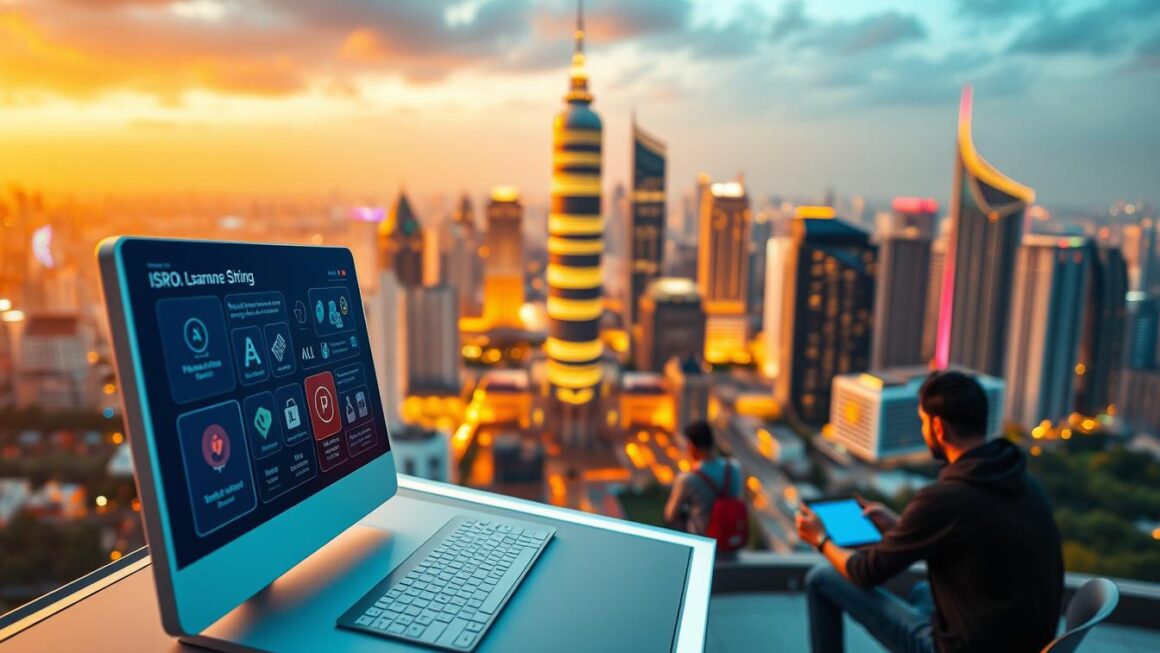
The 2025 Trump immigration policies are about to change how citizenship works for the Indian-American community. These new rules could change how children born to immigrant parents get U.S. citizenship.
I’ve studied how these changes might affect families. The proposed updates aim to change key parts of birthright citizenship in the U.S.
Trump’s policies could change how immigrant families get citizenship. For Indian immigrants, these changes might make planning families and legal status harder.
Key Takeaways
- Potential radical changes to existing birthright citizenship regulations
- Significant implications for Indian-American families
- Increased documentation requirements for immigrant parents
- Possible restriction of automatic citizenship for children born in the U.S.
- Complex legal challenges expected
Understanding Trump’s Proposed Birthright Citizenship Changes
Birthright citizenship is a key part of American immigration policy. The Trump administration’s proposed changes could change how we understand and apply it in the U.S.
The idea of jus soli, or birthright citizenship, is rooted in American law. It comes from the 14th Amendment. This principle has made nearly all people born in the U.S. citizens, no matter their parents’ immigration status.
Historical Context of Birthright Citizenship
Birthright citizenship became important after the Civil War. Key moments include:
- The 14th Amendment’s ratification in 1868
- Supreme Court decisions affirming broad citizenship rights
- Landmark cases protecting immigrant children’s citizenship status
Key Components of the New Policy
The new immigration reform aims to change citizenship rules. Key points include:
- Stricter documentation requirements for parents
- Narrowed definitions of automatic citizenship
- Enhanced verification processes for birth claims
“The proposed changes challenge decades of established citizenship interpretation” – Immigration Legal Experts
Constitutional Implications
The proposed changes raise big constitutional questions. Legal experts argue about the conflicts with the 14th Amendment and past court decisions.
I think these changes could lead to a lot of legal fights. They might even go to the Supreme Court. This could change immigration policy for a long time.
Citizenship law birthright other country not happy specially indian trump 2025
Changes to citizenship laws have caused big problems internationally. Countries like India are very worried about how these changes might affect their people in the United States.
Topics like undocumented immigrants and anchor babies are at the heart of this debate. These changes could change how many countries handle immigration.
“These changes represent a fundamental shift in how we understand national membership and migration rights,” says immigration policy expert Dr. Sarah Rodriguez.
International concerns include:
- Potential restrictions on family reunification
- Increased documentation requirements
- Reduced pathways for legal immigration
- Economic impact on transnational families
India is especially worried because of its big community in the United States. The new policy could change how Indian families plan to move and settle in the country.
| Country | Estimated Affected Immigrants | Primary Concerns |
|---|---|---|
| India | 4.6 million | Family-based immigration restrictions |
| China | 2.3 million | H1B visa and birthright complications |
| Mexico | 11.2 million | Comprehensive immigration policy changes |
The debate shows how complex issues of national sovereignty, human rights, and global migration are intertwined.
Impact on Indian Families Living in the United States
The proposed changes to birthright citizenship are causing a lot of worry in the indian-american community. Families are facing big challenges as they try to understand these new rules. These changes could change how families plan for the future and live together.
Immediate Effects on Expecting Parents
Expecting parents in the indian-american community are worried about their children’s citizenship. The new rules might:
- Make it harder to get birth documents
- Require more legal checks
- Make families with mixed citizenship status fear deportation
Long-term Consequences for Family Planning
Families are now thinking differently about how to get citizenship. Some are looking into other ways to make sure their kids are legal. The worry of being separated is really affecting them emotionally and mentally.
Financial Implications
| Financial Area | Potential Impact |
|---|---|
| Legal Consultation Costs | More money for immigration lawyers |
| Healthcare Planning | More costs for medical insurance and documents |
| Educational Investments | Uncertainty about kids’ future in school |
“The uncertainty is overwhelming. We’re planning our entire future around potential policy changes,” says Priya Sharma, an Indian-American professional in Silicon Valley.
These changes highlight the urgent need for clear immigration laws. Families need to know they can build a secure life in the United States.
Legal Framework and Constitutional Challenges
Understanding immigration reform means looking closely at birthright citizenship laws. New rules on jus soli rights face big constitutional hurdles. These need careful study.
The law on birthright citizenship is at a turning point. Key points to consider include:
- How the 14th Amendment is interpreted
- Challenges to current citizenship rules
- The role of the president in immigration
Experts say big changes in birthright citizenship laws must be closely checked. The balance between immigration policy and constitutional rights is a big debate.
“Changes to citizenship laws must withstand rigorous judicial review and protect fundamental constitutional principles.” – Constitutional Law Expert
Here’s a detailed look at possible legal hurdles:
| Legal Aspect | Potential Challenge | Constitutional Consideration |
|---|---|---|
| 14th Amendment Interpretation | Restrictive Citizenship Criteria | Equal Protection Clause |
| Presidential Executive Powers | Immigration Policy Modification | Separation of Powers |
| Jus Soli Rights | Birthright Citizenship Limitations | Fundamental Rights Preservation |
Legal fights over immigration reform will likely focus on equal protection and basic rights. The mix of national security and personal freedoms makes the law complex. It needs careful understanding.
Changes to Jus Soli Rights for Indian Immigrants
The rules for citizenship for Indian immigrants are changing. President Trump wants to make big changes. These could affect many families trying to become US citizens.
Before, getting citizenship was easy for kids born in the US. Birthright citizenship meant kids got citizenship automatically, no matter their parents’ status.
Current Status of Citizenship Rights
- Automatic citizenship for children born in the US
- No additional documentation requirements for parents
- Immediate recognition of birthright status
Proposed Documentation Requirements
Now, families will face tough new rules. Indian families must show they legally live in the US. They need to prove they’re eligible for citizenship.
- Verified legal status of parents
- Comprehensive immigration documents
- Proof of continuous residence
- Background checks for family members
“The proposed changes will fundamentally alter how we understand citizenship in America.” – Immigration Policy Expert
These changes could make it harder for Indian families to get citizenship. It might make the path to citizenship more complicated for their kids.
Economic Implications for Indian-American Communities

Trump’s immigration policies will change the economic scene for Indian-Americans. New rules could make it hard for professionals, entrepreneurs, and families. This community is known for its energy and success.
The effects of these changes are seen in several areas:
- Jobs for skilled Indian immigrants
- Starting new businesses
- Investments and money sent back home
- Long-term economic benefits
Experts say these changes could cause big problems. Indian-Americans play a big role in tech, healthcare, and new ideas. The new rules might:
- Shrink the talent pool in key fields
- Slow down new businesses
- Slow down growth in big cities
“The economic fabric of our communities is intrinsically linked to immigration policies” – Tech Industry Expert
| Economic Sector | Current Contribution | Potential Impact |
|---|---|---|
| Technology | $50 Billion | 20-30% Reduction |
| Healthcare | $35 Billion | 15-25% Workforce Reduction |
| Entrepreneurship | $100 Billion | 40% Startup Decline |
The economic effects of these policy changes will be huge. They could change the Indian-American community’s economic path for a long time.
Immigration Status Verification Process Changes
The world of immigration reform is always changing. This brings new hurdles for undocumented immigrants wanting to become citizens. Now, there are new rules for checking immigration status that will affect many Indian immigrants in the U.S.
New Documentation Requirements
Understanding the immigration system is getting harder. The new rules ask for more documents than before. Here’s what you need to know:
- Enhanced proof of continuous residence
- Comprehensive background verification
- Detailed employment history documentation
- Updated medical clearance certificates
Processing Timeframes
How long it takes to process immigration status is now very important. Here are some expected times:
| Application Type | Estimated Processing Time |
|---|---|
| Initial Status Verification | 4-6 months |
| Path to Citizenship Review | 12-18 months |
| Extended Documentation Review | 6-9 months |
I suggest you gather all your documents well in advance. Also, be patient during the process. The immigration world needs careful planning and knowledge of the latest rules.
“Documentation is the bridge between hope and legal status in the immigration journey.” – Immigration Policy Expert
It’s vital to keep up with these updates. This will help you understand the complex journey to citizenship in today’s immigration world.
Impact on H1-B Visa Holders and Their Families

Trump’s immigration policies are causing a lot of worry for the Indian-American community. This is especially true for H1-B visa holders. Changes to birthright citizenship could change the future for many professional immigrants in the U.S.
H1-B visa holders from India are facing big challenges. Deportation fears are growing because of possible policy changes. These changes could affect their families and careers. The uncertainty about their immigration status is making it hard for them to build their lives in America.
- Potential loss of citizenship rights for children born in the US
- Increased documentation requirements for visa renewal
- Higher risk of forced relocation
“The current immigration climate presents unprecedented challenges for skilled workers and their families,” says immigration policy expert Dr. Rajesh Mehta.
Families are now making tough decisions about their future. Some are thinking about:
- Returning to India preemptively
- Exploring alternative visa options
- Preparing for potential legal challenges
The economic and personal risks are very high. Professional networks, established careers, and family roots could all be at risk because of the proposed immigration changes.
Indian-American professionals need to stay informed and ready. Talking to immigration lawyers and keeping up with the changing laws is key to getting through these tough times.
International Relations Between US and India
Trump’s immigration policies could lead to big problems in US-India relations. These changes might upset the balance between the two countries. They could also affect the large and active Indian-American community.
Dealing with each other will get harder as these policies come into play. The new rules might mess up agreements and understanding between the countries.
Potential Diplomatic Responses
- Formal diplomatic protests from the Indian government
- Potential reconsideration of bilateral trade agreements
- Increased diplomatic negotiations at international forums
Trade Impact Considerations
Changes in citizenship laws could hurt the economy too. Here are some areas that might see problems:
- Technology sector collaborations
- H1-B visa professional exchanges
- Foreign direct investment patterns
“The intersection of immigration policy and international relations requires delicate diplomatic navigation” – Foreign Policy Expert
The Indian-American community is key in solving these issues. Their views and influence could help in future talks and agreements.
As things get more tense, both sides must find a way to keep good relations. They need to respect individual rights and keep strong partnerships.
Alternative Paths to Citizenship for Indians

For Indian immigrants, finding a way to citizenship can be tough. Immigration rules are strict and keep changing. It’s important to know other ways to get there.
There are a few main options for Indians looking to become citizens:
- Employment-Based Naturalization Professionals with special skills can get green cards through work. They need a job offer and must show they’re top in their field.
- Family Sponsorship Programs Family members of US citizens or green card holders can get citizenship. This is a quicker way to get legal status.
- Investment Immigration Investors can use EB-5 visas. They need to invest a lot in US projects. This way is fast but requires a lot of money.
“Immigration is not just about rules, it’s about human potential and opportunity.” – Immigration Policy Expert
Every path to citizenship has its own hurdles and rules. You need good documents, legal advice, and a plan to get through these steps.
Indian immigrants should keep up with immigration changes. They need solid plans to make sure they’re legally in the US.
Future Immigration Policy Predictions
The world of immigration reform is changing fast. Trump’s policies have made immigration rules stricter. This could change how the U.S. handles citizenship and immigration.
Looking ahead, several key developments are likely to impact immigration policy in the coming years:
- Increased scrutiny of birthright citizenship regulations
- Stricter documentation requirements for immigrant families
- Potential constitutional challenges to current immigration laws
Potential Legislative Changes
Lawmakers are planning big changes in immigration rules. They might make it harder for immigrants to prove their status. This could affect many immigrant families.
| Policy Area | Predicted Changes | Potential Impact |
|---|---|---|
| Birthright Citizenship | Narrowed interpretation | Reduced automatic citizenship |
| Visa Documentation | Enhanced background checks | Longer processing times |
| Family Immigration | Stricter reunification rules | Limited family-based immigration |
Timeline for Implementation
Immigration reform might happen in stages:
- 2025-2026: Initial policy drafting and legal reviews
- 2027: Potential legislative proposal and congressional debates
- 2028: Possible partial implementation of new immigration measures
“The future of immigration policy will be defined by careful balance between national security and humanitarian considerations.” – Immigration Policy Expert
These predictions show how immigration policy is always changing. It’s a big challenge to make immigration reform fair and comprehensive.
Conclusion
The proposed changes to citizenship law birthright are a big deal for the Indian-American community. They go beyond just policy tweaks. These changes could deeply affect how families plan their future in the United States.
Immigration reform is a complex issue that challenges current laws. The proposed changes need careful thought from lawmakers, immigrants, and legal experts. For Indian immigrants, it’s key to understand these changes to plan their family and career paths.
The mix of constitutional rights, economic chances, and diplomatic ties makes things tricky for the Indian-American community. Even though there’s still a lot of uncertainty, it’s important to stay involved. Keeping up with policy changes, joining discussions, and getting legal advice are essential steps.
The debate on birthright citizenship is ongoing. It shows how deep the conversations are about who we are as a nation. It’s about immigration status and what it means to be included in American society.
FAQ
How will Trump’s proposed changes to birthright citizenship affect Indian families in the United States?
The changes could affect Indian families a lot. They might not get citizenship automatically anymore. This could make things hard for expecting parents and those with young kids.
What are the key components of the proposed birthright citizenship law changes?
The changes aim to limit birthright citizenship. They want at least one parent to be a US citizen or permanent resident. This is a big change from the current law.
Will these changes affect H1-B visa holders from India?
H1-B visa holders might be hit hard. Their kids might not get citizenship automatically anymore. This could make planning their future in the US tough.
What are the potential economic implications for the Indian-American community?
The changes could hurt the economy a lot. They might reduce jobs, make starting a business harder, and block Indian immigrants from settling in the US.
Are there alternative paths to citizenship for Indians under these proposed changes?
Yes, there are other ways to get citizenship. You can get it through work, family, investment, or stricter naturalization processes. These options might become more important for Indian immigrants.
How might these proposed changes impact international relations between the US and India?
The policy could strain relations with India. India might worry about its citizens and feel discriminated against.
What constitutional challenges might these proposed citizenship law changes face?
The changes will likely face big legal hurdles. They could challenge the 14th Amendment and birthright citizenship. Legal experts think the Supreme Court might get involved.
How soon might these immigration policy changes be implemented?
It’s hard to say when they’ll happen. Supporters say it could start as early as 2025. But, it depends on politics and legal fights.
What should Indian families currently living in the US do to prepare?
Families should talk to immigration lawyers and keep good records. They should stay updated on policy changes and look into other immigration options. Keeping detailed immigration documents is key during this time.
How might these changes affect children already born in the US to Indian parents?
It’s not clear yet, but kids might be okay under current laws. Still, families should get legal advice to understand their situation and any possible effects.













